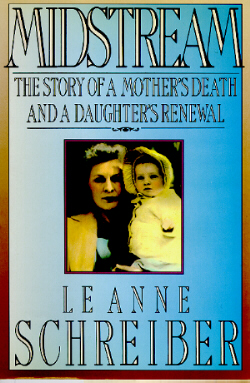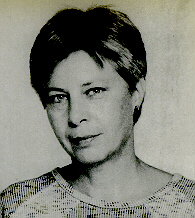NYS WRITERS INSTITUTE
HOME PAGE

LE ANNE SCHREIBER
PREVIOUS VISIT:
NYS Writers Institute Reading - February 18, 1997
The Art of the Essay & the Craft of Nonfiction: A Joint Reading and Discussion with Phillp Lopate
Le Anne Schreiber is the author of two memoirs, Midstream: The Story of a Mother's Death, and a Daughter's Renewal (1990), and Light Years (1996), both of which deal with the deaths of family members and the wild lands surrounding her home in a quiet community in upstate New York. Kirkus Review has called her writing "soulful" and "elegant" and Publishers Weekly has commented that to share in her insights "is a rare privilege."
Schreiber's career as a journalist began in 1974 when she accepted a writing job at Time magazine. While with Time she covered the Montreal Olympics in 1976. On the basis of her Olympic coverage, tennis star Billie Jean King asked her to be the editor-in-chief of her fledgling magazine, womenSports. When that magazine moved to California, Schreiber joined The New York Times Sports Department to help launch "Sports Monday," and eight months later she was named head of the department, the first woman to hold that position. In 1980, needing a break from sports, she asked to be transferred toThe New York Times Book Review where she worked as deputy book review editor for four years. She left The Times in 1984 to become a free-lance writer for publications ranging from Glamour to The Yale Review. In recent years she has taught in the Graduate Writing Department of Columbia University.
From Le Anne Schreiber's Work . . ."Sometimes, in the amber light that suffused my closed eyelids as I swam, an image would rise slowly through the water toward me, achieving an exquisite clarity as it came near to linger a moment before drifting away; the image was always a face, of either my mother or father or brother, as they had looked in health, and the faces brought with them a feeling of reconnection unavailable to me then through more deliberate efforts of memory. As pleased as I was by these images, I did not try to court or capture them. Over the years I had learned that consolation cannot be coerced, and so I took my solace when and where it came, with gratitude." - from Light Years
"When I'm fishing well, my concentration is so intensely focused on the surface of the stream that I enter a kind of trance, from which I emerge startled by some sudden sound or change in light. I'll look up, as if just awakened from a dream, and see a great blue heron taking flight at my approach, the tips of his spindly legs lagging three feet behind his crested head, curled claws still skimming the surface of the water. One hazy afternoon, I looked up, reentered time and felt a sudden searing stab of fear. Day had departed unnoticed by me and the last rays of the setting sun shot horizontally through the woods toward me like the beams of a motorcycle gang waiting in silent ambush." - from Midstream
 Approaching the age of forty, Le Anne Schreiber decided to leave prestige, power, pressure, and the city behind. She had been the first female editor of The New York Times sports section, then deputy editor of The New York Times Book Review. She had seen from the inside many of the worlds newly opened to women in the last two decades. Now she wanted a life in which there was space for thinking, maybe for writing--a life in which nature might play a larger role. When she had moved to a house in a rural hamlet in the Hudson River Valley, found the ideal trout stream, and mastered the art of the cast, she learned that her mother had pancreatic cancer.
Approaching the age of forty, Le Anne Schreiber decided to leave prestige, power, pressure, and the city behind. She had been the first female editor of The New York Times sports section, then deputy editor of The New York Times Book Review. She had seen from the inside many of the worlds newly opened to women in the last two decades. Now she wanted a life in which there was space for thinking, maybe for writing--a life in which nature might play a larger role. When she had moved to a house in a rural hamlet in the Hudson River Valley, found the ideal trout stream, and mastered the art of the cast, she learned that her mother had pancreatic cancer.
There are two transfiguring paths in Schreiber's memoir: one toward a new beginning, balanced by another toward death. Schreiber kept a journal of both, bringing to her observations of nature and her mother's demise the same precision, wonder, tenderness, and occasional outrage--at her own inadequacies and those of her family, at the misinformation or lack of communication from doctors, at the secrets families try to keep. Schreiber writes of humor and hope, as well as anger and despair. She learned how to protect her mother's pride, to conscript some humanity from the medical profession, and to honor the path she had chosen as well as the one forced upon her.
Written with innocence and restraint that develop a remarkable emotional power, Midstream is a moving, beautifully observed memoir about a mother's death and a daughter's renewal. Extraordinarily helpful for its honest and practical dialogue with dying, it is also, like Annie Dillard's Pilgrim at Tinker Creek and May Sarton's Journal of a Solitude, the celebration of a new world.
What Others Say About Le Anne Schreiber. . .
"Here, in Midstream, are the usual confusions of anxieties, angers, denials, and solicitude of children and husband as a mother dwindles inexorably into death. Behind and dancing around her shadow, the insistence of life as a house to rebuild, as the response to the seductions of a new other country. Le Anne Schreiber has written of this eternal pas-de-deux of life and death with a clear eye, with compassion, with verity, and with high skill." - Kate Simon
"A useful and beautiful book that resists all temptations to oversimplify. It illumines new areas of women's lives." - Mary Gordon
"This is spare and intense writing that speculates about why we are the way we are and how we are formed by our own thoughts. Few have either the aptitude or the opportunity for such reflection. To share it is a rare privilege." - Publishers Weekly on Light Years
"Schreiber's prose is pure, brimming with poetic turns. . .Midstream is a remarkable and power achievement." - Detroit News
"Schreiber writers so simply and sensitively, she is so astute in observations of human and animal behavior, so forthright in reports of frustration, anger, sorrow, as well as hope, pleasure, and even boredom that she brings light to the dark path of pain she describes." - Kirkus Review
For additional information, contact the Writers Institute at 518-442-5620 or online at https://www.albany.edu/writers-inst.
